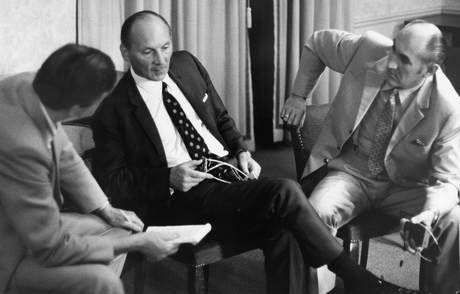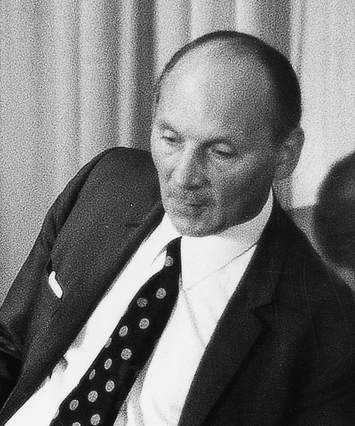Neville Cooper, founder of Britain’s Institute of Business Ethics, saw integrity as essential. If "there's no capitalism without conscience", in the words of George W Bush, following the Enron and WorldCom accounting scandals, then Neville Cooper would have agreed heartily. Cooper, the founder and first Chairman of Britain's Institute of Business Ethics, was however much more interested in practice than mere rhetoric.
He had a deep conviction that integrity in business was an absolute prerequisite to good business practice, and had little truck with the popular notion that “business ethics” was an oxymoron, despite scandals that rocked the business world. IBE, launched at the Mansion House in the City of London in 1986, grew in influence at a time when Robert Maxwell’s disappearing pension funds and the collapse of Barings Bank were grabbing the headlines.
For every rogue trader or accounting fraudster, Cooper believed there were far more business leaders of integrity who saw their roles as serving all their stakeholders—employees, customers and the wider community as well as shareholders—rather than lining their own pockets. Profit was, of course, an essential prerequisite to business survival. But Cooper saw IBE’s role as “promulgating the best thinking and practice of businesses and their whole contribution to society”. He believed that IBE’s launch coincided with a sea change in attitudes towards business conduct, away from a cynical perception that business was based solely on corporate greed, and he would have deplored recent accounting scandals.
When it came to boardroom “fat cats”, he said that there should be proper rewards for success. “But it is an abuse when there is reward for failure, like the golden parachutes which ensure that even if people are kicked out for incompetence they still take a very large amount of money.” Remuneration should be “clear, transparent and justifiable”, he insisted.
IBE grew out of the Christian Association of Business Executives of which Cooper had become Chairman in 1985. He was seeking an appeal to ethical values that would bridge faith and cultural backgrounds. IBE’s patrons include Britain’s Chief Rabbi and the Principal of the Muslim College in London as well as the Archbishop of Canterbury, the Cardinal Archbishop of Westminster and leaders of the Free Churches. IBE has published 18 reports highlighting best practice, in subjects ranging from the environment, the health of employees, and the use of information technology to the ethics of competition and company takeovers. One study, for instance, showed that environmental initiatives could actually help companies to reduce costs.
But Cooper believed that IBE’s biggest contribution was to ensure that major UK companies have clear and detailed written codes of ethical conduct. In this, IBE was responding to the task urged upon it at its launch by the then director-general of the Confederation of British Industry, Sir Terence Beckett. At that time, only one in six leading companies had written codes. Now one in two does. Cooper likened codes to a hammer: “It doesn’t build a house, but you don’t go far without it.” A code could ensure that “practice in a company conforms to policy”.
Neville John Cooper was born on 7 June 1924 in Portsmouth, the son of a Yorkshire engineer and businessman. He was educated at Sherbourne School, Dorset, and studied engineering at Queens College, Oxford. He later completed the British Advanced Management Programme at Harvard Business School.
He inherited his father’s robust approach of “calling a spade a spade”. A formative experience came early in his career when he was recruited by British Oxygen to a new post, “to transform industrial relations”. He recalled developing “considerable trust and cooperation” with the trade union leaders. During a complex wage negotiation, Cooper thought he had got boardroom agreement on the pay offer. He sent a copy to the union in advance of negotiations to give them time to mull it over. But it was premature. The board had not discussed the pay offer and Cooper’s boss told him, “You can’t go ahead”.
Someone suggested that he buy time by telling the union that he had flu and must postpone the negotiation. Cooper would have none of such deception. Instead, he promptly got on the phone to his union counterpart: “Look, Bill, we’ve made a hell of a mess of this situation. If you distribute the figures I have sent you I shall be intensely embarrassed. If the Board doesn’t authorize it, I can’t make the offer but you will have proof that I thought this was the right offer. Please help me and hold off distributing the figures for a week.” There was silence for a moment, Cooper recalled, before “Bill” replied, “Of course I will, Neville”, much to Cooper’s relief. Cooper later commented: “That intensified the trust between us so much that many future problems were solved which might not have been otherwise.”
In 1964 he married Barbara Jardine, whose father had been a District Commissioner in the North-West Frontier Province of India. They had met two years previously through their common involvement with the Moral Re-Armament movement.
He was Executive Director of Standard Telephones and Cables (since acquired by Nortel Networks) in the early 1970s, at a time when the company had to close a Northern Ireland factory. Management made the decision two years in advance, and Cooper recalled that they went through much “heart-searching” about when to inform the workforce. “It was not necessarily good for morale to be under a sentence of death. There could be demonstrations and strikes. We had announced that we would be open and honest with employees about employment prospects and share information when we knew it. Should we tell them? The answer was yes. Our principle was as valid in bad times as in good. But it had to be applied intelligently.”
The employees came up with the idea that they should offer themselves as a skilled workforce to other potential employers. They produced brochures, paid for by the company. This ensured that productivity remained high and that there were no industrial relations problems. “It was to all our advantage to be able to demonstrate what an excellent workforce it was,” said Cooper. “To my astonishment they did succeed and in the end sold themselves to two different companies who between them employed more than we had.”
Cooper became Vice-President of ITT, UK, the British arm of the American telecoms group, in the mid 1970s and Chairman of European Electronic Systems. He also launched the Top Management Partnership in 1972 to provide a network of chairmen and chief executives who would support each other by calling in expertise to boardrooms. “Top business people can often help each other better than management consultants,” Cooper believed. The Partnership has held dialogues with members of the Cabinet and senior civil servants on issues such as how to make Britain more competitive. He was the author of several publications, including the Cooper Report entitled School Industry Links (1981) on education and industry, commissioned by the Secretary of State for Industry and Science under Margaret Thatcher’s government.
Cooper's international role was enhanced by his membership, on the steering committee, of the Swiss-based Caux Round Table (CRT) group of senior business executives, founded in 1986. CRT promotes business values worldwide and has met in countries ranging from China, Japan and India, to Mexico and the USA. Cooper helped to draft CRT’s Principles for Business, a highly acclaimed international code of best practice published in 1994. Though he was an Anglican, the Vatican recognized his contribution to business values by conferring on him that year a Papal knighthood of the Order of St Gregory the Great. The citation described his work as “the leaven in the dough of the business world”.
In 2001, the CRT was concluding its gathering in London on September 11th, arranged by Cooper and addressed by International Development Secretary Clare Short, when the news of the terrorist atrocities in the USA came through, stunning the US business executives taking part.
A keen theatre-goer, Cooper was Chairman of the Friends of the Westminster Theatre when it was owned by Moral Re-Armament. He was also a member of the Magic Circle for 46 years, performing at international business conferences and children’s birthday parties. Though he was an amateur he was elected to the hallowed Inner Magic Circle in January 1995. Asked which was more difficult, tricking his audience or getting businessmen to be ethical, he replied unequivocally: “Oh, undoubtedly bamboozling the audience. I have a high regard for my business colleagues, the majority of whom, I believe, are among the most ethical elements of our society.”
He died of a heart attack in London, aged 78, following a long illness and is survived by his wife and two married daughters.
Neville Cooper, businessman, Chairman, The Christian Association of Business Executives (1985-1997), founder and Chairman, The Institute of Business Ethics (1986-1997), born 7 June 1924, married Barbara Jardine 1964, died 9 September 2002.
English


